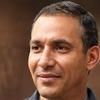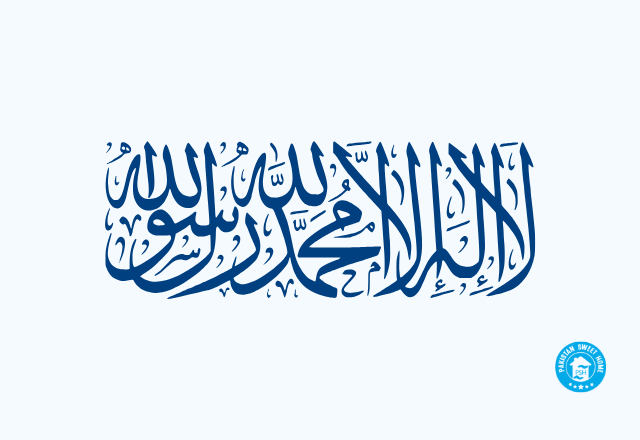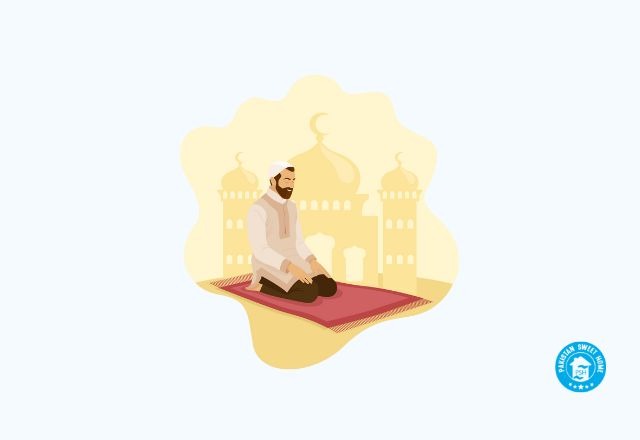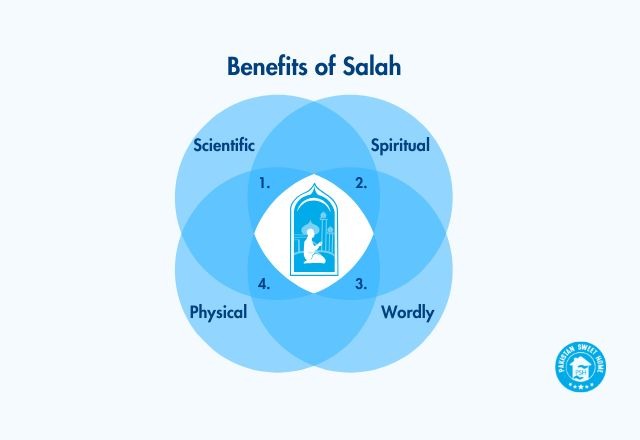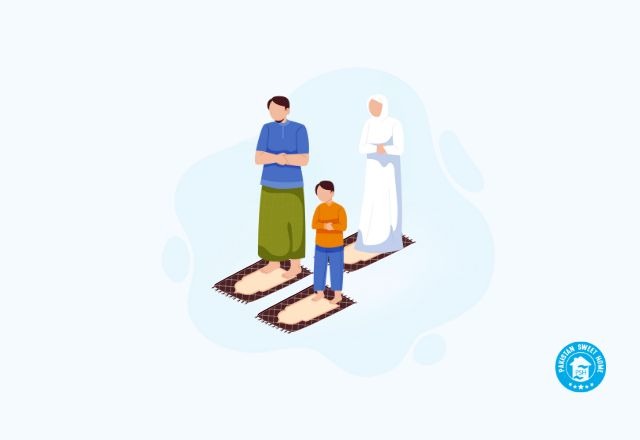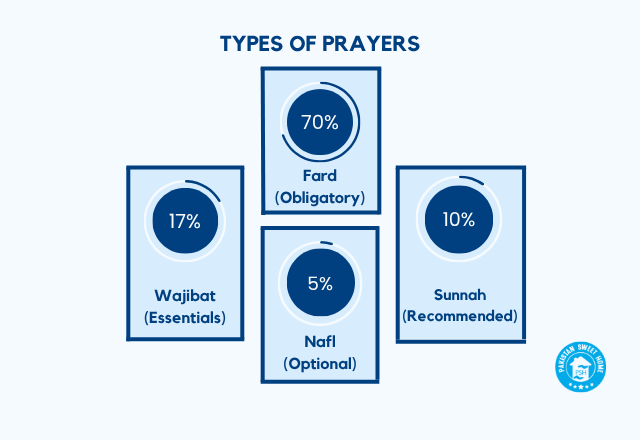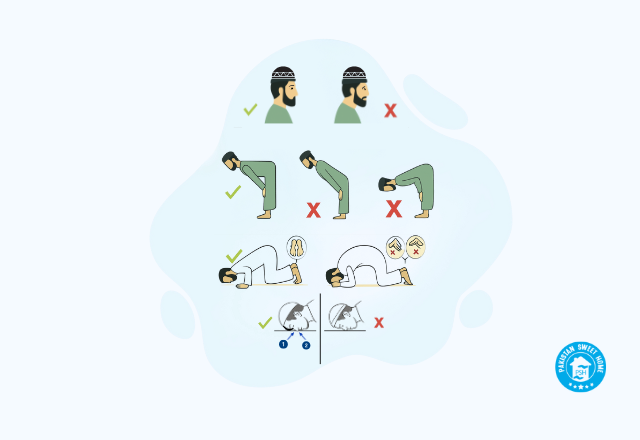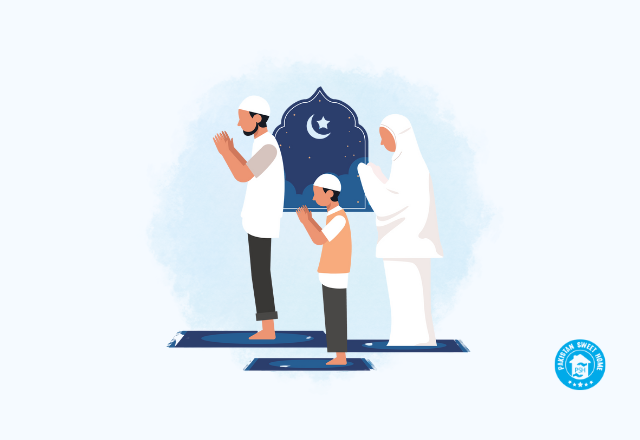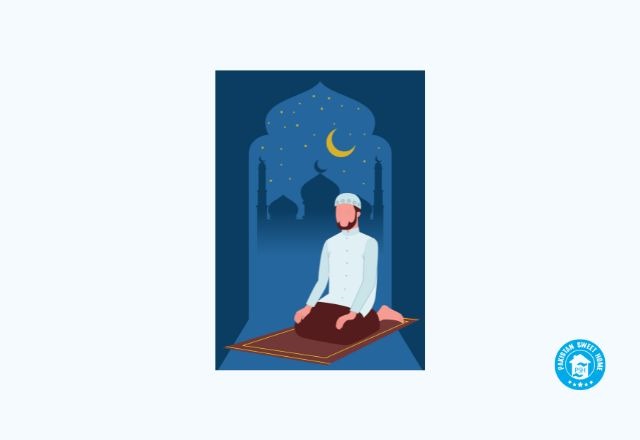Shahada (or Shahādah) is the first pillar of Islam and the Islamic declaration of faith.
It affirms the oneness of Allah and the acceptance of Muhammad (ﷺ) as His final messenger. This simple yet profound statement is the gateway into Islam for every believer. Without Shahada, other acts of worship, such as prayer, fasting, or charity, hold no true meaning.
It is recited daily in prayers, whispered at birth, and hoped to be the last words at death. For Muslims, it is more than words; it is a lifelong commitment to faith and obedience.
Let’s take a deeper look into the meaning, significance, and role of Shahada in Islam.
What Are the Words and Meaning of Shahada?
The Shahada is testimony of faith, and it is the essence of Islamic belief. Its words declare absolute faith in the oneness of Allah and acceptance of Muhammad (ﷺ) as His final messenger. Every Muslim memorizes this testimony, as it is central to prayer, conversion, and daily life.
- In Arabic: أَشْهَدُ أَنْ لَا إِلَٰهَ إِلَّا اللهُ وَأَشْهَدُ أَنَّ مُحَمَّدًا رَسُولُ اللهِ
- Transliteration: Ash-hadu an la ilaha illa Allah, wa ashhadu anna Muhammadur Rasulu Allah
- English translation: “I bear witness there is no god but Allah, and I bear witness that Muhammad is the Messenger of Allah.”
What Key Concepts Does Shahada Cover?
The Shahada is not just a short statement; it contains the entire foundation of Islamic belief.
Within its two phrases, it encompasses the two most fundamental concepts in Islam: Tawhid (the oneness of Allah) and Risalah (the prophethood of Muhammad ﷺ).
Together, these ideas shape the Muslim worldview, guiding how a believer worships, lives, and interacts with others. Without understanding these core concepts, the Shahada would remain words without meaning or transformation.
What Hadith Highlights the Importance of Shahada?
The Prophet Muhammad (ﷺ) emphasized the Shahada as the key to salvation. He said:
Narrated by Anas ibn Malik:
One day, Muʿadh ibn Jabal was riding with the Prophet Muhammad (ﷺ). The Prophet called out, “O Muʿadh ibn Jabal.” Muʿadh replied, “At your service, O Messenger of Allah.” The Prophet repeated this three times, and each time Muʿadh responded the same way.
Then the Prophet (ﷺ) said:
“Whoever sincerely testifies that there is no god but Allah and that Muhammad is the Messenger of Allah, Allah will save him from the Hellfire.”
Muʿadh asked, “O Messenger of Allah, should I not share this good news with the people so they may rejoice?” The Prophet (ﷺ) replied, “Do not tell them, for they may rely solely on this and neglect their duties.”
Muʿadh later narrated this Hadith before his death, fearing he would be sinful if he concealed such knowledge.
(Sahih al-Bukhari: 128)
This Hadith highlights two key points:
- Promise: Whoever sincerely declares the Shahada will be saved from Hellfire by Allah’s mercy.
- Condition: The testimony must come from the heart and should not lead to neglecting duties like prayer, zakat, and righteous deeds.
What is Tawhid (Oneness of God)?
The first part of the Shahada is “La ilaha illa Allah”, which means “There is no god but Allah.”
This powerful phrase affirms Tawhid, the absolute oneness and uniqueness of Allah. It rejects every form of polytheism, idol worship, or the belief that anything shares in Allah’s divinity.
Tawhid is not just about belief; it transforms a Muslim’s life by making worship, trust, and reliance directed only to Allah. Every prayer, act of charity, and moral choice begins with this foundation of divine oneness.
Who is Allah (SWT) According to Islam?
In Islam, Allah (SWT) is the One and Only God, worshipped by all Muslims worldwide. The word “Allah” is unique; it has no plural or gender, highlighting His absolute oneness.
He is the Creator, Sustainer, and Lord of the entire universe, unlike anything we can imagine. Nothing resembles Him, and no one can be compared to Him in essence, power, or attributes. When people asked about Allah, the Prophet Muhammad (ﷺ) responded with verses revealed by Allah Himself:
“Say: He is Allah, the One. Allah, the Eternal Refuge. He neither begets nor is born, nor is there to Him any equivalent.”
(Surah Al-Ikhlas 112:1–4)
What is the Prophethood of Muhammad?
The second part of the Shahada is “Muhammadur Rasulullah”, which means “Muhammad is the Messenger of Allah.” This declares faith in Prophet Muhammad (ﷺ) as the final messenger in the long line of prophets.
It requires accepting his teachings, following his Sunnah (way of life), and obeying the guidance he brought from Allah. Belief in his prophethood also means acknowledging that no prophet will come after him, making Islam the final and complete message for humanity.
Through this phrase, Muslims commit to living according to the Prophet’s example in worship, ethics, and daily life.
How Does One Declare the Shahada to Become Muslim?
Declaring the Shahada is the formal step that marks a person’s entry into Islam. It is a simple yet life-changing act, requiring no elaborate rituals, ceremonies, or formal documents. What matters most is that the person recites the words with sincerity, belief in the heart, and understanding of their meaning.
Traditionally, new Muslims say the Shahada in front of witnesses, such as at a mosque, to affirm their faith publicly. However, even a private recitation with true conviction is valid in the eyes of Allah. The Shahada transforms not just one’s religion, but also their identity, responsibilities, and spiritual path.
- One must recite the Shahada with sincerity and full understanding.
- It can be said privately or publicly. Witnesses are often present, especially when converting.
- No special ritual is required beyond the honest recital.
How Is Shahada Practised in a Muslim’s Life?
Shahada is not a one-time declaration; it continues to shape every stage of a Muslim’s life.
From daily prayers to major life events, Muslims constantly renew and live by this testimony.
It reminds believers that faith is not just belief in the heart but also action and practice.
- Recited in daily prayers (Salat), especially in Tashahhud and other places.
- Heard in the Adhan (call to prayer) multiple times each day.
- Whispered into the ears of newborns, and often the last words before death.
- Remains a guiding principle: all actions, beliefs, and ethics in Islam flow from it.
What Quranic Evidence Supports Shahada?
The Shahada is rooted deeply in the Quran, which repeatedly affirms Allah’s oneness and the mission of His prophets.
While the exact words of the Shahada are not always found together in one verse, their meaning is emphasized throughout the scripture. This shows how both parts of the declaration, Tawhid, and Prophethood, are divinely established.
- The Quran has many verses affirming “there is no deity but Allah.”
- Also, many verses are about obeying the Prophet Muhammad (ﷺ).
- Though in the Quran the two phrases are not always side by side, the concept appears clearly.
What Are Common Misconceptions About Shahada?
Despite its central role in Islam, Shahada is sometimes misunderstood, especially by those new to the faith. Many think it is only a spoken formula or that it requires complicated rituals.
In reality, Shahada is simple, profound, and rooted in sincerity rather than external form.
- It’s just words — but without belief in the heart, words mean nothing.
- Needs elaborate ceremony — actually, sincerity matters more than ceremony.
- Can be recited in any language — meaning can be translated, but Arabic is the traditional and liturgical form.
What is Shahada’s Role in Unity and Identity?
The Shahada is more than a personal declaration; it is the bond that ties the entire Muslim community together. Across languages, cultures, and races, Muslims repeat the same words, creating a universal creed that transcends borders.
This unity is visible in worship, community, and shared values, reminding believers that they are part of one global ummah.
- Universal declaration: Every Muslim, no matter their background, affirms the same words of faith.
- Shared identity: It removes divisions of race, wealth, and status by uniting all under one creed.
- Global connection: Whether in prayer or at Hajj, millions recite the Shahada in the same language.
- Turning point: For new Muslims, it marks entry into a worldwide faith community with common beliefs.
- Symbol of equality: It emphasizes that all believers stand equal before Allah, bound by the same testimony.
By affirming one God and one Messenger, the Shahada becomes a living symbol of solidarity and equality among Muslims everywhere.
How Can Someone Deepen Their Understanding of Shahada?
Shahada is not only about reciting words; it is about living by them with knowledge and conviction.
To truly benefit, a Muslim should go beyond memorization and explore the deeper meanings of Tawhid and Prophethood. This helps transform the Shahada from a statement on the tongue into a guiding principle for life.
- Learn Arabic words and memorize the text so you can recite it correctly in prayer and rituals.
- Study its meaning: explore the theology of Tawhid (oneness of Allah) and Risalah (Prophethood).
- Reflect on transformation: consider how the statement should shape your actions, ethics, and decisions.
- Seek knowledge: listen to lectures, read the Quran, and study Hadith that explain the Shahada.
- Integrate it daily: apply the Shahada in real life, not just during rituals, so it becomes a living faith.
Can You Take Shahadah Without Witnesses?
Yes, a person can take the Shahadah without witnesses. In Islam, becoming a Muslim is a matter between the individual and Allah (ﷻ). If someone sincerely declares the testimony of faith, believing in the oneness of Allah and the Prophethood of Muhammad (ﷺ), they are considered a Muslim even if no one else is present.
Witnesses are not required for the Shahadah to be valid, but they can serve practical purposes:
- Documentation: Having witnesses helps when updating personal or legal records.
- Community support: Declaring Shahadah publicly allows the Muslim community to welcome and support the new believer.
- Ease in life matters: Witnessed declarations can be useful for marriage, travel, or official recognition.
The true essence of Shahadah is sincerity and belief in the heart. Public declaration is encouraged for support and recognition, but a private testimony is still valid in Islam.
To sum up, the Shahada is more than a phrase; it is the foundation of a Muslim’s belief and identity. The words affirm both Tawhid, the oneness of Allah, and the Prophethood of Muhammad (ﷺ). Declaring the Shahada formally marks the entry into Islam, and it continues to be practiced daily in prayers, rituals, and significant life moments.
The Quran provides clear evidence for both parts of the Shahada, while addressing misconceptions that often confuse people. Historical development, variations, and its spiritual impact give the declaration even deeper meaning.
It is also important to note that the Shahada does not require witnesses to be valid; sincerity and belief in the heart are what truly count, though witnesses may help with documentation and community recognition.
Shahada teaches that true faith is belief expressed through action and service. At PSH (Orphan Care Foundation), orphans are supported with care and compassion. This reflects the essence of Shahada, devotion to Allah, and kindness to humanity.

info@pakistansweethome.org.pk
(051) 4865856
+92 335 1118477


